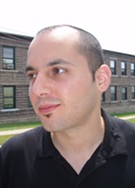Published December 7, 2005 at 1:30 a.m.
Back in the '90s, scientists identified the quark molecule -- a sub-atomic particle that has a tendency to disappear upon close examination. Vermont's Vorcza, a trio formed at the tail end of the same decade, are similarly ephemeral. Comprising organist Ray Paczkowski, bassist Robinson Morse and drummer Gabe Jarrett, the group has entertained audiences with groove heavy, Technicolor splatter-jazz for nearly eight years. Their chronology is somewhat discontinuous, however: Scheduling conflicts among members prevent Vorcza from performing as often as fans would like. Sometimes, it's as if they don't exist at all.
On Friday, December 9, the trio celebrates the release of its long-awaited sophomore effort, Corner of the Morning, at the Higher Ground Showcase Lounge. The show takes place the day after Paczkowski gets home from a national tour backing up guitar god Trey Anastasio. It'll be the first time in months he's played with Vorcza.
Despite periods of inactivity, Vorcza has thus far led a charmed existence. The band became a local favorite not long after coming together, due to the strength of their live performances. Vorcza's early gigs at Burlington's Red Square are the stuff of legend, and they've played in venues from the Big Apple to Nova Scotia. Their debut release in 2002, titled Maximalist, was a rare mix of the spontaneous and the cerebral, pleasing jazzers and jam fans alike. Corner improves upon the formula, with reflexive grooves, simmering organ funk, and even vocals. Guest artist Anastasio has an inspired turn on "A Call to Demons" which is sure to be a treat for fans disappointed by his recent, more streamlined solo output.
If Paczkowski's fellowship with Anastasio has increased the band's exposure, it's also resulted in missed opportunities. For example, the trio's upcoming disc isn't exactly new. Recorded more than a year ago, its release was delayed until Vorcza could play shows to support it. Being in a band with such limitations has led its members to adopt a Zen-like detachment. "I've totally let go of any expectations about Vorcza," Morse states. "At this point I just enjoy it when it happens."
Morse, 26, and Paczkowski, 37, were both members of acclaimed nine-piece jazz orchestra viperHouse, a band led by Michael Chorney that re-wrote the rules of jazz, world and funk music. Although Paczkowski's free-form compositions were a major part of that group's sound, he was interested in working with a smaller unit. "Vorcza started as a way to play in a stripped down setting when viperHouse were off the road," Paczkowski explains. "The kind of music I was most interested in was of an improvisational nature, where you arrange and write on the fly. A trio maximizes that ability."
A chance meeting with Jarrett, 34, solidified the lineup. "Our original drummer [viperHouse skinsman P.J. Davidian] moved to Chicago, but we still had a gig on the books," Paczkowski recalls. "Rob ran into Gabe on the street in Burlington, so we asked him to join us." Jarrett, the percussive offspring of renowned jazz pianist Keith Jarrett, brought a pioneering, rhythmic edge to their sound.
Vorcza's organ-driven jazzedelia has been compared to that of another popular trio, Medeski, Martin & Wood. Paczkowski claims any similarity is a coincidence of instrumentation. "Our styles are quite different, I'd say," he states. "We lean towards a heavier thing, sound-wise." Morse believes Paczkowski is too original to cop another band's style. "I don't think Ray is influenced by hardly anything, honestly," he says. "The man doesn't have a CD player or a stereo in his car. He doesn't interact with modern culture much."
Though Vorcza's music is largely improvised, don't call them a jam band. "I think there are people in the jam audience that go for what we're doing," Jarrett says. "But there are also a lot of folks that are into the whole 'sonic landscape' thing." This could be because Vorcza's improvs eschew frenetic soloing. "I think there's a tendency for some groups and audiences to think that for a song to be successful, it has to have this orgasmic explosion that everyone recognizes as the peak," Jarrett says. "We don't set out to always satisfy on that level."
Jarrett's background in progressive rock, punk and jazz has resulted in a confident attack and deft touch behind the kit. Although he grew up in a musical family, they wouldn't have disowned him had he decided on, say, dentistry. "Music wasn't encouraged in an outright way beyond a certain age," he explains. "When I was really young, it was 'take piano lessons, eat your broccoli,' that kind of thing. When I started playing for my own enjoyment, I never thought about making money doing it. I was blissfully ignorant of the idea that I'd have to find a way to support myself."
Eventually, he figured it out. An in-demand drummer, Jarrett has played with Jazz Mandolin Project, ex-Phish bassist Mike Gordon, and jazz trombonist and composer Josh Roseman, to name a few. He's also an adjunct lecturer at SUNY Plattsburgh and St. Michael's College, and teaches privately as well.
Bassist Morse is the son of Vermont Jazz Ensemble and Vermont Philharmonic trombonist Burr Morse, as well as the great-grandson of U.S. Senator George Aiken. As a child, he practiced trombone under his dad's guidance. In high school, he taught himself bass guitar. According to Morse, there was never any doubt about what he wanted to do with his life. "As early as I can remember I was into music more than anything else," he says.
The records his parents played in his youth helped shape his articulate, funky bass style. "They were into Ray Charles, Stevie Wonder and Al Green," Morse recalls. "I got into rock when I was a little older, stuff like Led Zeppelin and Jimi Hendrix. From there I went through just about anything you can imagine."
During downtime from Vorcza, Morse gigs with a number of acts, including Michael Chorney's Magic City and his own small combo. He also works as an apprentice to instrument maker Paul Perley.
Much of Vorcza's creative fire comes from Paczkowski. Whether he's composing elegant jazz ballads, leading a ferocious improv or playing sideman, the keyboardist is a potent musical force. His heroes include whiskey-soaked crooner Tom Waits and eccentric piano legend Thelonious Monk. These influences manifest in his playing through richly textured chords and off-kilter runs. Even when playing with Anastasio, Paczkowski follows his own muse. "There really can be no boss when the music is honest," he says.
A former dairy worker, Paczkowski now supports himself solely through music. Has he ever considered another career? "I always thought I'd become a field-science type guy," he says. "I hope to find other things that give me what music does, in a pragmatic and spiritual way. I just haven't committed to them, I guess."
Juggling his current commitments is difficult enough. "In reality, there isn't much time," says Paczkowski. "It can be a real pain in the ass to find a moment we have in common. But it happens. Vorcza can get away with just a little bit of practice, because the emphasis is so much on improvisation."
All members agree that Paczkowski's work with Anastasio is important, and that it's inconvenient. "To some extent it helps us," Jarrett relates. "But at this point, it may impede our progress more than anything."
Paczkowski looks on the bright side. "Obviously it creates time issues," he explains of his touring time. "But I think, in the end, my playing with Trey will have been more of a help than a hindrance."
The band hopes to be a lot more active in the coming year, with regional touring planned for winter and early spring. "We're definitely gonna be more present than we have been in the last three months," Jarrett says.
Downtime aside, there are deep-seated reasons why these three musicians continue to play together. "It's trust, basically," says Paczkowski. "Trust that the choices each of us makes on the stage are made for musical reasons, trust that we are listening hard to what each other is doing, and trust that there's no such thing as a mistake."
While Morse enjoys his other musical outlets, Vorcza is still important to him. "I like all of the variety, but for me, this is still the perfect vehicle," he says. Jarrett adds that the music itself is what keeps them all on board. "The reason we haven't said 'fuck it' is basically because, whenever we can do it is better than never doing it," he says. "It's that kind of group. It just feels good."
More By This Author
Speaking of...
-

Two Local Band Directors March in the Macy's Parade
Nov 22, 2023 -

Before a Burlington Show, the Wood Brothers Get Back to Basics
Oct 26, 2023 -

After a Half-Century of Leading Local Ensembles, Steven and Kathy Light Prepare a Musical Farewell
May 3, 2023 -

Double E 2023 Summer Concert Series Kicks Off With the Wailers
Mar 17, 2023 -

UVM’s New School of the Arts Gathers Many Creative Disciplines Under One Roof
Sep 14, 2022 - More »
Comments
Comments are closed.
From 2014-2020, Seven Days allowed readers to comment on all stories posted on our website. While we've appreciated the suggestions and insights, right now Seven Days is prioritizing our core mission — producing high-quality, responsible local journalism — over moderating online debates between readers.
To criticize, correct or praise our reporting, please send us a letter to the editor or send us a tip. We’ll check it out and report the results.
Online comments may return when we have better tech tools for managing them. Thanks for reading.












































